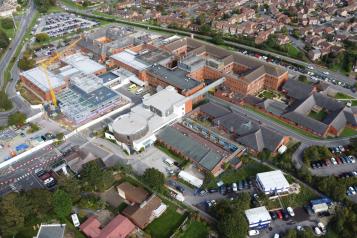Hospital Trust celebrates 20 Years of Diabetic Screening Programme

The service, which began in 2003, has been providing high quality eye screening for diabetic patients across the region, helping to prevent sight loss and other serious complications associated with diabetes.
Over the past two decades, the programme has screened over 326,000 patients, identifying those at risk of developing diabetic retinopathy, a condition that can lead to blindness if left untreated. With diabetes affecting the sight of more than 1,700 people each year, the service’s early detection and treatment has saved countless patients from vision loss and provided life-transforming intervention.
The service was first launched on 24 March 2003, with a single camera and the funding for 6,000 patients. However, the demand for the service quickly became clear, and by Christmas the funding was increased to support an additional 3,000 patients on the register. In July 2004, the service expanded to Montagu Hospital and the Vermuyden Centre, further increasing their capacity and reach in the local community.
In November 2016, the service expanded yet again, this time to provide a prison screening service with a mobile camera. The following year, in March 2017, the service began screening at the Trust’s Bassetlaw site, leading to an additional 8,000 patients being added to the screening register.
Today, the service has grown significantly, with over 32,000 patients now on the register. To target non-attenders, the service recently opened a ‘Super Saturday’ clinic at the Eco Power Stadium, designed to reach as many diabetic patients in the region as possible.
Made up of 21 dedicated colleagues, including a consultant clinical lead, specialist nurses, screener graders and administrative support, this highly skilled team of healthcare professionals help to ensure all patients receive excellent patient-centred care and support.
Dr Shivani Dewan, Clinical Lead for the Diabetic Eye Screening Programme at DBTH, said: “We are incredibly proud of our service and the impact it has had on the lives of our patients. For twenty years our team have worked incredibly hard following a holistic approach to provide the best possible care for diabetic patients. Celebrating this milestone has given us a refreshed sense of purpose and value, and we look forward to continuing our excellent service for our local communities for many more years.”
Over the last two decades, the team have promoted the service in various outreach events, helping to increase the awareness of screening detection and early attendance. In September 2018, the team met with the Doncaster Rovers to discuss the dangers of diabetic retinopathy and the consequences of inaction, prompting the athletes to initiate important discussions in the local community and with family and friends.
The success of the Diabetic Eye Screening Service at DBTH is evident in its number one ranking in routine screening uptake in the country, excelling over 47 screening programs nationwide. The dedication and commitment of the team in delivering exemplary care to patients has secured this impressive achievement, placing the Trust as a leading diabetic screening provider.
To mark this special anniversary the team hosted a celebration event, inviting past and present colleagues to come together to reflect on the history and successes of the service. A highlight of the celebration included a speech made by Dr John Hosker, a former colleague who originally set up the service and maintained the service’s clinical lead until his retirement in 2016. Dr Hosker’s talk provided a unique perspective on the early days of the service, offering the chance for colleagues to reminisce and recognise the service’s milestones.
Speaking about the anniversary, Richard Parker, Chief Executive at DBTH, said: “The Diabetic Eye Screening Service has been a cornerstone of our Trust’s commitment to delivering high-quality care to the local community for two decades. This fantastic milestone is a testament to the hard work and dedication of the team behind the service who have had an incredible impact on so many lives in the region.”
“I would like to extend my congratulations and thanks to all colleagues, past and present, who have contributed to the success of the service over the past twenty years and look forward to continuing our work in providing the best possible care to our patients in the years to come.”


